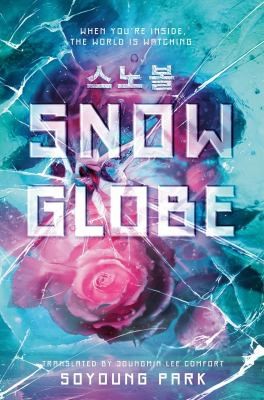
Snowglobe
By Soyoung Park
Translated by Joungmin Lee Comfort
Teen Fiction
Climate change has created a world of constant winter. Temperatures reach 50 below zero daily. Commoners trudge every day to work at a power plant. There, they labor like hamsters on a wheel to generate the power needed to keep living bearable and to supply power to Snowglobe, a city under a glass dome and the sole region that is warm. Everyone living in Snowglobe is an actor or director. In exchange for their climate-controlled life of luxury, they provide reality TV programs to entertain the masses outside. Essentially, Snowglobe is a massive studio. It is run by the exceedingly powerful Yi family and their meida conglomerate, the Yibonn Media Group.
This is the world portrayed in Snowglobe, in which our main character Chobahm lives her meager existence with her mother, grandmother, and twin brother. Every day, along with her mother and brother, she braves brutal conditions to make her way to work at the power plant. Like most commoners, Chobahm’s bright spot in life is the reality TV programs broadcast from Snowglobe. Her favorite program is Goh Around, starring Goh Haeri, who is the Taylor Swift of the post-apocalyptic world. It so happens that Chobahm is a stunning look-alike for Haeri, and people frequently tell her so.
One day Chobahm is approached by Cha Seol, the director of Goh Around. Unfortunately, the star Haeri has taken her own life (off camera) and Chobahm is being tapped as her replacement so the show can continue. Chobahm accepts the offer and sees this as her ticket out of her grim existence into the world she has always dreamed of. However, upon her arrival in Snowglobe, it does not take long for Chobahm to realize that life there is not as perfect as it seems. It is a world of secrets and a world where actors are disposed of when they no longer suit the directors’ needs. Other plot twists ensue, but I don’t want to spoil them here.
On an entertainment level, the book was a real page-turner for me. But there is a deep side to the novel as well. Snowglobe portrays a society in which the gulf between the “haves” and “have nots” has grown extreme, with the toil of the lower class supporting the posh life of the privileged. This can be seen as a commentary on present-day socioeconomic conditions. Also, the “grass is always greener” concept is explored. Commoners aspire to the glittering life of Snowglobe, but, as Chobahm learns, life there is not as perfect as it seems from outside. The reader is invited to reflect on what is important in life. By the end of the novel, Chobahm realizes that her less than perfect life with those she loves is better than the supposedly desirable life in Snowglobe.
Snowglobe is brilliantly translated from its original Korean, and reads impeccably. Park’s character development is strong. I truly feel Chobahm’s attachment to her family, especially her brother, and sense how much she misses them in the end. This is part of a planned duology, so I will be on the lookout for the sequel. I definitely recommend investing time in this chilling dystopian world, especially if books like The Hunger Games or programs like Squid Games are in your wheelhouse.
Bryan Latimer
Zauel Library